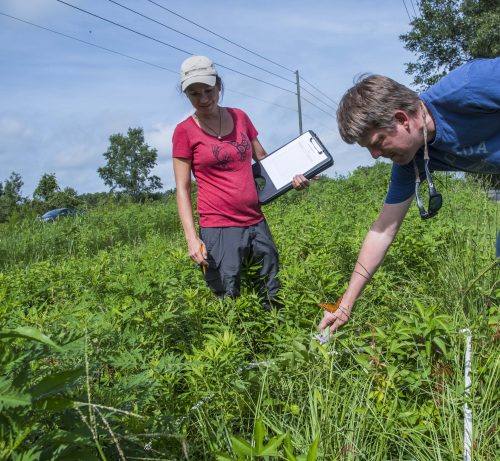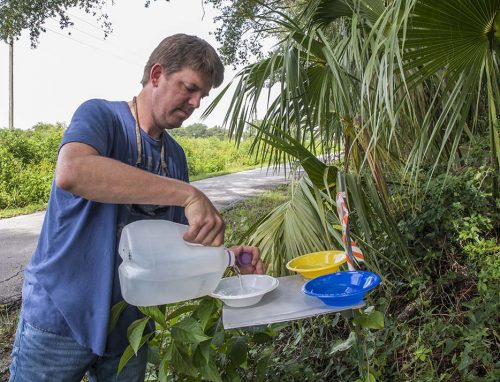
GAINESVILLE, Fla. — The Florida Museum of Natural History recently received a Duke Energy Foundation grant for pollinator research related to vegetation management in utility rights of way.
Jaret Daniels, director of the museum’s McGuire Center for Lepidoptera and Biodiversity and a University of Florida associate professor of entomology and nematology, received the $85,000 grant award last year with the possibility of expanding it into a two-year grant totaling $180,000. The grant enables the study of how differences in rights of way vegetation management practices can affect floral diversity and pollinator abundance.
Utility rights of way can play an important ecological role by serving as a network of living corridors for pollinators and other wildlife, linking many adjacent agricultural and undeveloped lands, Daniels said. These mile-long stretches of land used for power lines are maintained with mowing and selective herbicide use.
“This study will show the diversity that occurs within these areas and how changes in management practices can potentially improve the health and abundance of pollinator species,” Daniels said. “It is my hope that the research will enhance the visibility of the conservation value such lands can provide.”

Daniels and his six team members are currently establishing a baseline for the number and diversity of plant species and pollinators within 12 rights of ways in North Central Florida. After the baseline work is completed, the team will compare plant and pollinator diversity and abundance in different rights of way with varying rates of mowing and herbicide use.
The team is assessing the numbers of flower species and available blossoms quarterly and sampling pollinator species monthly.
“We’re grateful for the partnership with the Duke Energy Foundation, which helped jumpstart this work,” Daniels said. “It is essential for us to expand work in these landscapes.”
-30-
The Florida Museum of Natural History, celebrating its 100th year in 2017 as the state museum of natural history, inspires people to value the biological richness and cultural heritage of our diverse world and make a positive difference in its future. The public museum is located at 3215 Hull Road just east of Southwest 34th Street in the University of Florida Cultural Plaza in Gainesville. For more information visit floridamuseum.ufl.edu or call 352-846-2000. The Florida Museum’s primary collections and research facility, Dickinson Hall, houses most of the museum’s more than 40 million objects and specimens, one of the nation’s largest natural history collections. For more Florida Museum research and collections news, visit floridamuseum.ufl.edu/science or follow us on social media, @FloridaMuseum.
The Duke Energy Foundation provides philanthropic support to address the needs of the communities where its customers live and work. The foundation provides more than $30 million annually in charitable gifts. The foundation’s education focus spans kindergarten to career, particularly science, technology, engineering and math (STEM), early childhood literacy and workforce development. It also supports the environment and community impact initiatives, including arts and culture.
-###-
Writer: Catalina Ruiz, PRintern@flmnh.ufl.edu
Source: Jaret Daniels, 352- 273-2022, jdaniels@flmnh.ufl.edu